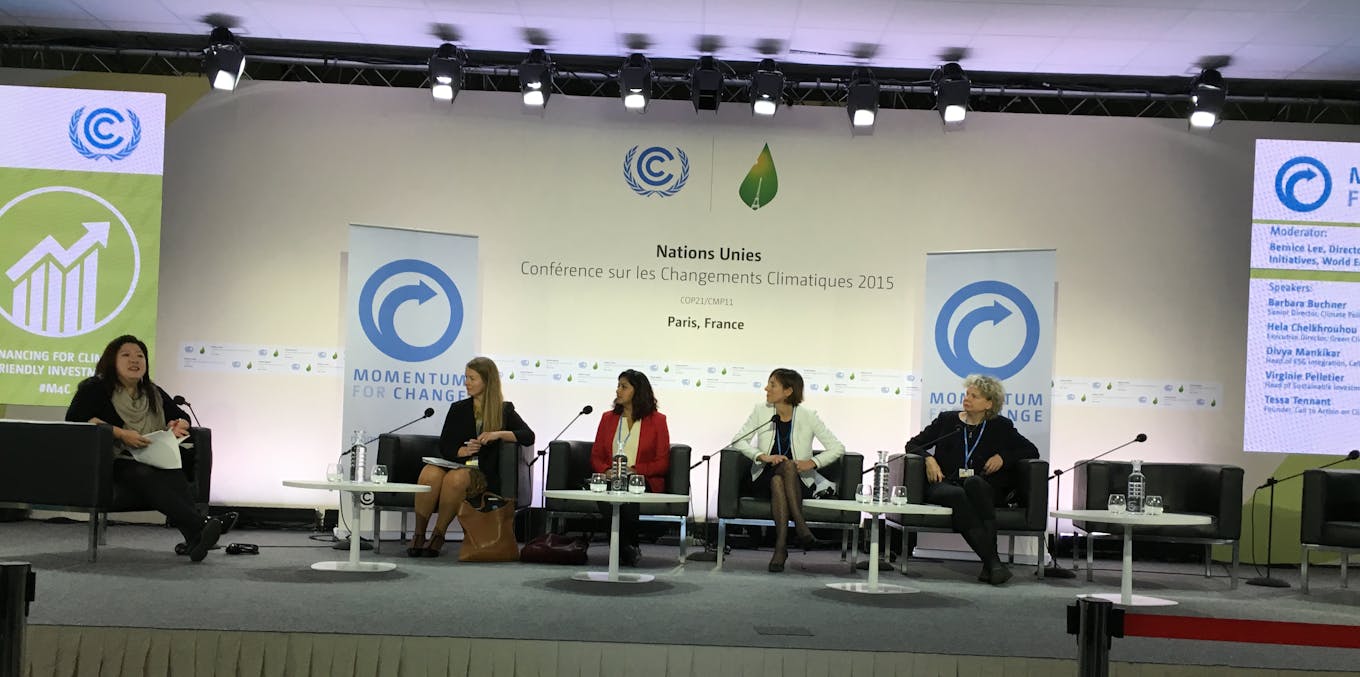With more money than ever before invested in low carbon and climate resilience projects, there is “unstoppable” momentum for green financing in helping the world cope with the effects of climate change, experts said on Wednesday.
To continue reading, subscribe to Eco‑Business.
There's something for everyone. We offer a range of subscription plans.
- Access our stories and receive our Insights Weekly newsletter with the free EB Member plan.
- Unlock unlimited access to our content and archive with EB Circle.
- Publish your content with EB Premium.
Speaking at a panel held at the sidelines of the United Nations climate change talks in Paris, Barbara Buchner, senior director of U.S. think tank Climate Policy Initiative, noted that more than US$391 billion was invested in 2014 in climate projects, a 18 per cent jump from 2013.
Most of the money was for projects surrounding renewable energy, energy efficiency and sustainable transport, she added.
But while this is a huge amount, it still falls short of what is needed to help vulnerable regions and countries cope with the effects of climate change.
The International Energy Agency (IEA) said last month in a report that US$16.5 trillion is needed from 2015 through 2030 to achieve the global goal of limiting temperature rise to below two degrees Celsius. That works out to just over US$1 trillion a year.
“
Even if there isn’t a strong deal, there is still a way for the financial industry to work with governments because they don’t necessarily want to wait for some magic global moment. They want to get working now.
Tessa Tennant, founder, Call to Action on Climate Finance
Experts speaking at the panel said the good news is that the ramping up of climate financing is “unstoppable” because of the national commitments that more than 190 countries have made ahead of the climate change talks this week.
“The momentum is unstoppable,” said Tessa Tennant, founder for Call to Action on Climate Finance, a worldwide group of global climate finance and responsible investing organisations including non-profit groups Climate Bonds Intiative, CDP and Ceres.
“Even if there isn’t a strong deal, there is still a way for the financial industry to work with governments because they don’t necessarily want to wait for some magic global moment. They want to get working now,” she added.
Among the groups shifting funds towards clean technology are pension funds controlling billions of dollars. One of them is California Public Employees’ Retirement System (CalPERS), one of the world’s biggest pension funds.
Divya Mankikar, head of environmental, social and governance (ESG) integration of CalPERS, said that the US$300 billion fund with assets on six continents is transforming its portfolio into a low-carbon one.
“One way we are doing that is talking to our portfolio companies to push them towards low-carbon growth,” she said. “Another way is advocacy with regulators. We need them to scale back fossil fuel subsides and put a price on carbon, so we engage with them constantly.”
It is also actively looking for large climate-related projects to invest in but the main challenge is finding projects that fit its risk profile and tolerance.

The panel discussion on climate financing at Le Bourget, Paris. From left: Moderator Berenice Lee, head of climate change and resource security initiatives, World Economic Forum; Barbara Buchner, senior director, Climate Policy Initiative; Divya Mankikar, head of ESG integration, CalPERS; Virginie Pelletier, head of sustainable investment and finance, BNP Paribas; Tessa Tennant, founder, Call to Action on Climate Finance. Image: Eco-Business.
Pelletier said the bank has been pooling climate-related infrastructure projects of all sizes and matching them with prospective institutional investors such as pension funds and corporate investors. This is where banks are playing a key role, said Virginie Pelletier, head of sustainable investment and finance at French lender BNP Paribas.
Its Tera Neva initiative, established with partners European Investment Bank, is a 500 million euros fund to invest in green projects. It is been fully subscribed.
“This shows the growing interest among investors for solutions that not only give financial returns but also have a positive impact on the environment,” Pelletier said. ”This is the direction the industry is heading.”





















